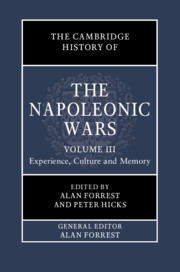Book contents
- The Cambridge History of the Napoleonic Wars
- The Cambridge History of the Napoleonic Wars
- The Cambridge History of the Napoleonic Wars
- Copyright page
- Contents
- Figures
- Maps
- Contributors to Volume III
- Introduction to Volume III
- Part I The Experience of War
- Part II The Experience of Imperial Rule
- 6 Blockade and Economic Warfare
- 7 Crossing Borders: Encounters with the Other
- 8 Popular Resistance: The Case of Napoleonic Italy
- 9 Collaboration: The Case of the Duchy of Warsaw
- 10 Military Resistance: Desertion
- 11 Liberation: Myth and Reality in Germany
- Part III War, Culture and Memory
- Part IV The Aftermath and Legacy of the Wars
- Bibliographic Essays
- Index
9 - Collaboration: The Case of the Duchy of Warsaw
from Part II - The Experience of Imperial Rule
Published online by Cambridge University Press: 05 August 2022
- The Cambridge History of the Napoleonic Wars
- The Cambridge History of the Napoleonic Wars
- The Cambridge History of the Napoleonic Wars
- Copyright page
- Contents
- Figures
- Maps
- Contributors to Volume III
- Introduction to Volume III
- Part I The Experience of War
- Part II The Experience of Imperial Rule
- 6 Blockade and Economic Warfare
- 7 Crossing Borders: Encounters with the Other
- 8 Popular Resistance: The Case of Napoleonic Italy
- 9 Collaboration: The Case of the Duchy of Warsaw
- 10 Military Resistance: Desertion
- 11 Liberation: Myth and Reality in Germany
- Part III War, Culture and Memory
- Part IV The Aftermath and Legacy of the Wars
- Bibliographic Essays
- Index
Summary
‘Poles! Napoleon the Great, the invincible, is entering Poland with an army of 300,000. Let us not explore the secrets of his plans, let us try to be worthy of his glory.’ This appeal, issued on 3 November 1806 in Berlin by General Jan Henryk Dąbrowski and Józef Wybicki, both ardent apologists for the Emperor, sought to persuade Poles to rise up in support of Napoleon and to fight on his side against the Prussians.1 Wybicki, a former deputy to the Polish diet (sejm) and publicist, was a talented writer, but the enthusiastic response which the appeal evoked was not the result of his literary skills. Events in the Polish lands and the political attitudes of Poles in and after 1806 were shaped by the political situation in the final decades of the eighteenth century.2
- Type
- Chapter
- Information
- The Cambridge History of the Napoleonic Wars , pp. 181 - 200Publisher: Cambridge University PressPrint publication year: 2022

